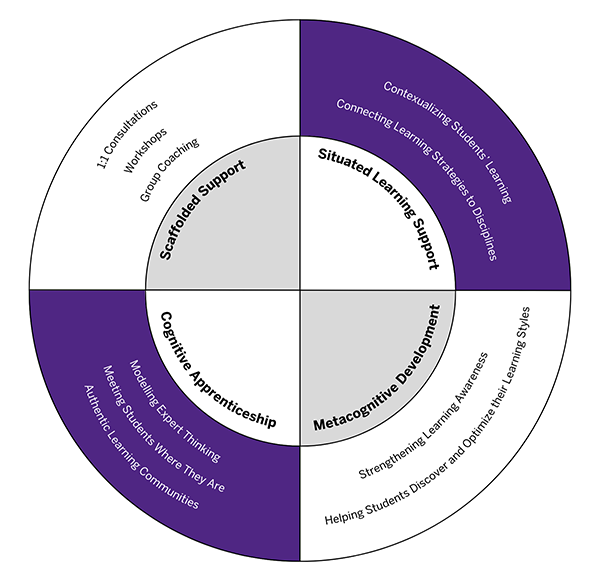Support
We're here to support and enhance your learning experience. We study the science of learning and how you can discover your personal pathway to success. Look below for a list of the areas involved in effective and efficient learning at the post-secondary level. Spend some time exploring the areas and while doing so, consider which components impact you as a student.
Not Sure Exactly What Learning Help You Need?
We have many resources and services that our team of learning specialists organize, to help you with the areas involved in effective and efficient learning at the post-secondary level, listed below. But how do you really know if motivation is the problem? What if it's your study skills that are impacting your motivation?
To help you think about this, our team has put together a Learning Skills Self-Assessment for you to complete at your own pace! Click the button below and fill out a 10 minute self-assessment. You will get your results immediately, as well as an email with your answers and a tailored list of important resources designed to help you improve your skills and confidence as a learner!
*Please note: we are currently limiting students to one(1) entry on the Self-Assessment. Please make sure to save your responses, which will be emailed to you, for future reference!*
Click Here to Complete the Learning Skills Self-Assessment!
Learn more about how we support you with...
Time Management, Habits & Mindsets
- Time Management - Constructing a schedule and routine that promotes sustainable learning throughout a semester, balancing academic and personal commitments through realistic and flexible prioritization, and remaining focussed on goals while managing interruptions.
- Motivation - Willingness to do things that are important for long-term goals, even if they do not feel desirable or intrinsically motivating.
- Mindsets - Ways students think about or perceive themselves as learners and their learning environments, including beliefs, attitudes and dispositions. Examples of mindsets include fixed/growth, optimism/pessimism, receptive/resistant, perfectionist/minimal standards, confidence/fear.
- Managing challenges and setbacks - Confronting and taking responsibility for challenges such as disappointing grades, transitioning to new learning requirements or expectations, academic probation, and difficulties communicating with supervisors and professors.
- Connecting with resources - Effective use of instructional materials provided in a course and awareness of support resources and willingness to use them. Examples of resources include professors, help centres, counsellors, and support networks such as family or friends.
Study Skills, Lectures & Reading
- Learning Strategies - Developing strategies for effective learning in areas related to lectures and course readings, creating organized and effective independent learning habits, managing the demands of group work, and improving skills related to participating in seminars and giving presentations.
- Metacognition - Active awareness and understanding of how we learn, thinking about tasks, how to best approach them, evaluating and reflecting on the effectiveness of approaches, and making adjustments as needed.
Test Taking
- Test-Taking - Understanding test demands, creating a study plan for upcoming tests, improving comprehension & memory strategies, and standardized test research and strategies.
Schematic representation of the LDS Framework

